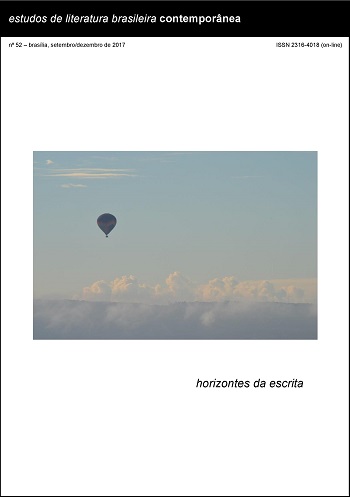Ethics and hospitality:
the motive of the monster in O filho da mãe, by Bernardo Carvalho
DOI:
https://doi.org/10.1590/2316-4018528Abstract
This article takes its point of departure a historical series in Brazilian literature in which monstrosity is a central theme, in order to understand the importance of this motif in contemporary fiction, especially in the interrelated fields of fiction and history, ethics and hospitality, as represented in O filho da mãe, by Bernardo Carvalho. Using Mikhail Bakhtin’s (1988) theory of the dialogic imagination and Jacques Derrida’s (2003) theories of hospitality, the essay discusses the novel’s social world, as well as other narrative elements, such as the figures of kunak and the chimera. The analysis of the novel’s social world is complemented by the conceptualization of literature as a passage, proposed by Lucia Helena (2009).
Downloads
References
BAKHTIN, Mikhail (1988). Questões de literatura e de estética: a teoria do romance. São Paulo: Hucitec. p. 134-163.
BAKHTIN, Mikhail (2014). The dialogic imagination. Edited by Michael Holquist. Translated by Caryl Emerson and Michael Holquist. 19. ed. Austin: University of Texas Press.
CARVALHO, Bernardo (2009). O filho da mãe. São Paulo: Companhia das Letras.
DERRIDA, Jacques (2003). Anne Dufourmantelle convida Jacques Derrida a falar da hospitalidade. São Paulo: Escuta.
HELENA, Lucia (2009). A literatura como passagem: reflexões em torno das ficções em desassossego. Alea, Rio de Janeiro, v. 11, n. 1, p. 111-129, jan./jun.
HELENA, Lucia (2012). Náufragos da esperança: a literatura na era das incertezas. Rio de Janeiro: Oficina Raquel.
HOLQUIST, Michael (2014). Introduction. In: BAKHTIN, Mikhail. The dialogic imagination. Edited by Michael Holquist. Translated by Caryl Emerson and Michael Holquist. 19. ed. Austin: University of Texas Press.
JAKOBSON, Roman (2006). A geração que esbanjou seus poetas. São Paulo: Cosac Naify.
JOHNSON, Richard (2004). O que é, afinal, estudos culturais? In: SILVA, Tomaz Tadeu da (Org.). O que é, afinal, estudos culturais? 3. ed. Belo Horizonte: Autêntica. p. 7-131.
NASSAR, Raduan (1989). Lavoura arcaica. 3. ed. rev. São Paulo: Companhia das Letras.
OLIVEIRA, Paulo César Silva de (2010). Poética da distensão: entre a transcrição da paisagem e a escritura do caminho. Manaus: Muiraquitã.
RIMBAUD, Arthur (1871). Canto de guerra parisiense. Carta a Paul Démeny. Charleville, 15 maio. Tradução de Leo Gonçalves. Disponível em: <https://goo.gl/8CGr4A>. Acesso em: 12 out. 2013.
ROSA, João Guimarães (2006). Grande sertão: veredas. Rio de Janeiro: Nova Fronteira.
SANTOS, Milton (2002). Por uma outra globalização: do pensamento único à consciência universal. 9. ed. Rio de Janeiro; São Paulo: Record.
TOLSTÓI, Leo (2009). Hadji Murad. Mineola, New York: Dover Publications.
Downloads
Published
How to Cite
Issue
Section
License
Authors who publish in this journal agree to the following terms:
a) The authors maintain the copyright and grant the journal the right of first publication, the work being simultaneously licensed under the Creative Commons Attribution License-Non Commercial 4.0 which allows the sharing of the work with acknowledgment of the authorship of the work and publication this journal.
b) Authors are authorized to enter into additional contracts separately, for non-exclusive distribution of the version of the work published in this journal (eg publish in institutional repository or as a book chapter), with authorship recognition and publication in this journal.
c) Authors are allowed and encouraged to publish and distribute their work online (eg in institutional repositories or on their personal page) after the editorial process, as this can generate productive changes, as well as increase the impact and citation of published work (See The Effect of Free Access).
d) The authors of the approved works authorize the magazine to, after publication, transfer its content for reproduction in content crawlers, virtual libraries and the like.
e) The authors assume that the texts submitted to the publication are of their original creation, being fully responsible for their content in the event of possible opposition by third parties.


